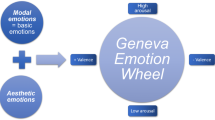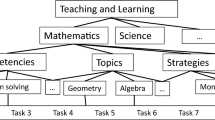Abstract
This book contains original contributions from scholars from various parts of world.
Access this chapter
Tax calculation will be finalised at checkout
Purchases are for personal use only
Similar content being viewed by others
References
Ashkanasy, N. M., Hartel, C. E. J., & Zerbe, W. J. (Eds.). (2000). Emotions in the workplace: Research, theory, and practice. Westport: Quorum Books.
Barbalet, J. (2002). Introduction: Why emotions are crucial. In J. Barbalet (Ed.), Emotional sociology (pp. 1–9). London: Blackwell.
Beatty, B. R. (2000). The emotions of educational leadership: Breaking the silence. International Journal of Leadership in Education, 3, 331–357.
Beatty, B. R., & Brew, C. (2004). Trusting relationships and emotional epistemologies: A foundational leadership issue. School Leadership and Management, 24(3), 329–356.
Bullough, R. V., Jr., Bullough, D. A. M., & Mayes, P. B. (2002). Learning to teach as an intern: The emotions and the self. Teacher Development, 6(3), 417–431.
Day, C., & Kington, A. (2008). Identity, well-being and effectiveness: The emotional contexts of teaching. Pedagogy, Culture & Society, 16(1), 7–23.
Day, C., Kington, A., Stobart, G., & Sammons, P. (2006). The personal and professional selves of teachers: Stable and unstable identities. British Educational Research Journal, 32(4), 601–616.
Goleman, D. (1995). Emotional intelligence. New York: Bantam Books.
Goodlad, J. I., Mantle-Bromley, C., & Goodlad, S. J. (2004). Education for everyone: Agenda for education in a democracy. San Francisco: Jossey-Bass.
Hargreaves, A. (1994). Changing teachers, changing times: Teachers’ work and culture in the post modern age. London: Cassell.
Hochschild, A. R. (1983). The managed heart: Commercialization of human feeling. Berkley: University of California Press.
Hochschild, A. R. (1990). Ideology and emotion management: A perspective and path for future research. In T. Kemper (Ed.), Research agendas in the sociology of emotions (pp. 117–134). Albany: State University of New York Press.
Kassem, C. L. (2002). Developing the teaching professional: What teacher educators need to know about emotions. Teacher Development, 6(3), 363–372.
Kelchtermans, G. (2005). Teachers’ emotions in educational reforms: Self understanding, vulnerable commitment, and micropolitical literacy. Teaching and Teacher Education, 21, 995–1006.
Lasky, S. (2005). A sociocultural approach to understanding teacher identity, agency and professional vulnerability in a context of secondary school reform. Teaching and Teacher Education, 21, 899–916.
Lazarus, R. S., & Cohen-Charash, Y. (2001). Discrete emotions in organizational life. In R. L. Payne & C. L. Cooper (Eds.), Emotions at work: Theory, research and applications in management (pp. 45–81). Chichester: Wiley.
Little, J. W. (1996). The emotional contours and career trajectories of (disappointed) reform enthusiasts. Cambridge Journal of Education, 26(3), 345–360.
Noddings, N. (1996). Stories and affect in teacher education. Cambridge Journal of Education, 26(3), 435–447.
Oplatka, I. (2007). Managing emotions in teaching: Toward an understanding of emotion displays and caring as nonprescribed role elements. Teachers College Record, 109(6), 1374–1400.
Salovey, P., & Mayer, J. D. (1990). Emotional intelligence. Imagination, Cognition and Personality, 9(3), 185–211.
Samier, E. A., & Schmidt, M. (2009). Editors’ introduction. In E. A. Samier & M. Schmidt (Eds.), Emotional dimensions of educational administration and Leadership (pp. 1–17). London: Routledge.
Schutz, P. A., & Pekrun, R. (Eds.). (2007). Emotion in education. Burlington: Academic Press.
Schutz, P. A., & Zembylas, M. (Eds.). (2009). Advances in teacher emotion research: The impact on teachers’ lives. Dordrecht: Springer.
Stets, J. E., & Turner, J. H. (Eds.). (2006). Handbook of the sociology of emotions. The Netherlands: Springer.
Tamara, B. (2002). Shame: An emotional response to doing Mathematics as an adult and a teacher. British Educational Research Journal, 28(5), 705–721.
Van Veen, K., & Lasky, S. (2005). Editorial: Emotions as a lens to explore teacher identity and change: Different theoretical approaches. Teaching and Teacher Education, 21(8), 895–898.
Wenger, E. (1998). Communities of practice: Learning, meaning and identity. Cambridge: Cambridge University Press.
Wharton, A. (1993). The affective consequences of service work: Managing emotions on the job. Work and Occupations, 20, 205–232.
Author information
Authors and Affiliations
Corresponding author
Editor information
Editors and Affiliations
Rights and permissions
Copyright information
© 2011 Springer Science+Business Media B.V.
About this chapter
Cite this chapter
Day, C., Lee, JK. (2011). Emotions and Educational Change: Five Key Questions. In: Day, C., Lee, JK. (eds) New Understandings of Teacher's Work. Professional Learning and Development in Schools and Higher Education, vol 100. Springer, Dordrecht. https://doi.org/10.1007/978-94-007-0545-6_1
Download citation
DOI: https://doi.org/10.1007/978-94-007-0545-6_1
Published:
Publisher Name: Springer, Dordrecht
Print ISBN: 978-94-007-0544-9
Online ISBN: 978-94-007-0545-6
eBook Packages: Humanities, Social Sciences and LawEducation (R0)




